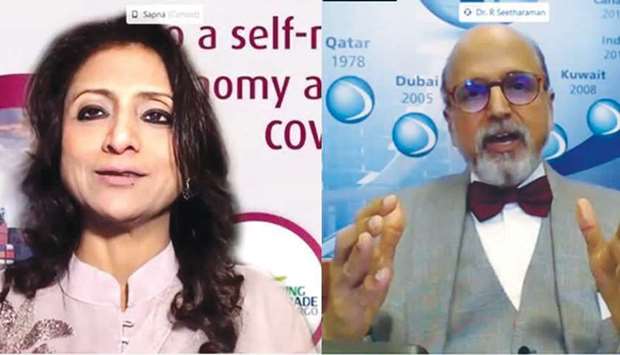Qatar's banking sector, which has displayed its resilience to the Covid-19, ought to see strengthened lending amidst strong macroeconomic growth backed by the North Field South Project (NFS), Doha Bank chief executive Dr R Seetharaman said on Tuesday.
The overall lending growth is close to 7% year-to-date at the end of third quarter of 2020, with that to government sector expanding 4.7%, real estate (4.1%), consumption (4.6%), contracting (10%), services (12.4%) and trading (12%), Seetharaman told the virtual Qatar Trade Summit (QTS) 2020, which will conclude on Wednesday.
Highlighting that deposit growth has been 3.6% and that the money supply (M1, M2 and M3) has increased during the year; he said, "The Qatar banking sector has demonstrated its resilience to Covid-19 on account of these measures.”
Qatar sold $10bn bonds in April 2020. It offered interest equivalent to 300 basis points (bps) over the US Treasuries for a $2bn five-year tranche, 305 bps over the same benchmark for a $3bn 10-year tranche and 4.4% for the 30-year paper of $5bn, he said in his keynote themed “Qatar Banking Growth 2020: Reflecting on Qatari resilience”.
Giving insight into the domestic economy; he said, “Qatar economy is expected to contract by 4.5% in 2020 and recover by 2.5% in 2021."
Highlighting that Hamad Port opened in September 2017 has general cargo terminal with a capacity of 1.7mn tonnes annually, he said this has contributed to Qatar’s trade and infrastructure development.
Qatar's free zones give companies access to fast growing nearby markets in the Middle East, North Africa, Europe and Western Asia, and will contribute to the economic growth of Qatar and increase the diversification of the Qatari economy, he said, adding corporates in free zones can explore funding and non-funding facilities from banks.
As many as eight stadia are planned for the FIFA 2022, which had given boost to contract and project financing in Qatar, according to him.
Referring to the recent Public-private partnership law, which covered various PPP models including BOT (build operate and transfer) model, Seetharaman said, "The private sector is expected to leverage from this new law."
In October 2020, Qatar allowed foreigners to own property. Non-Qataris could own properties in nine areas, up from three before, while the number of areas where foreigners may use real estate subject to usufruct has been increased to 16, bringing the total number of areas designated for ownership and usufruct by non-Qataris to 25. "This can give boost to property sector lending,” he said.
Seetharaman highlighted on technology and development in Qatar as he said Qatar Fintech Hub, which is co-founded by Qatar Development Bank, aims to develop the fintech industry in Qatar, in accordance with the Qatar National Fintech Strategy created by the Qatar Central Bank.


